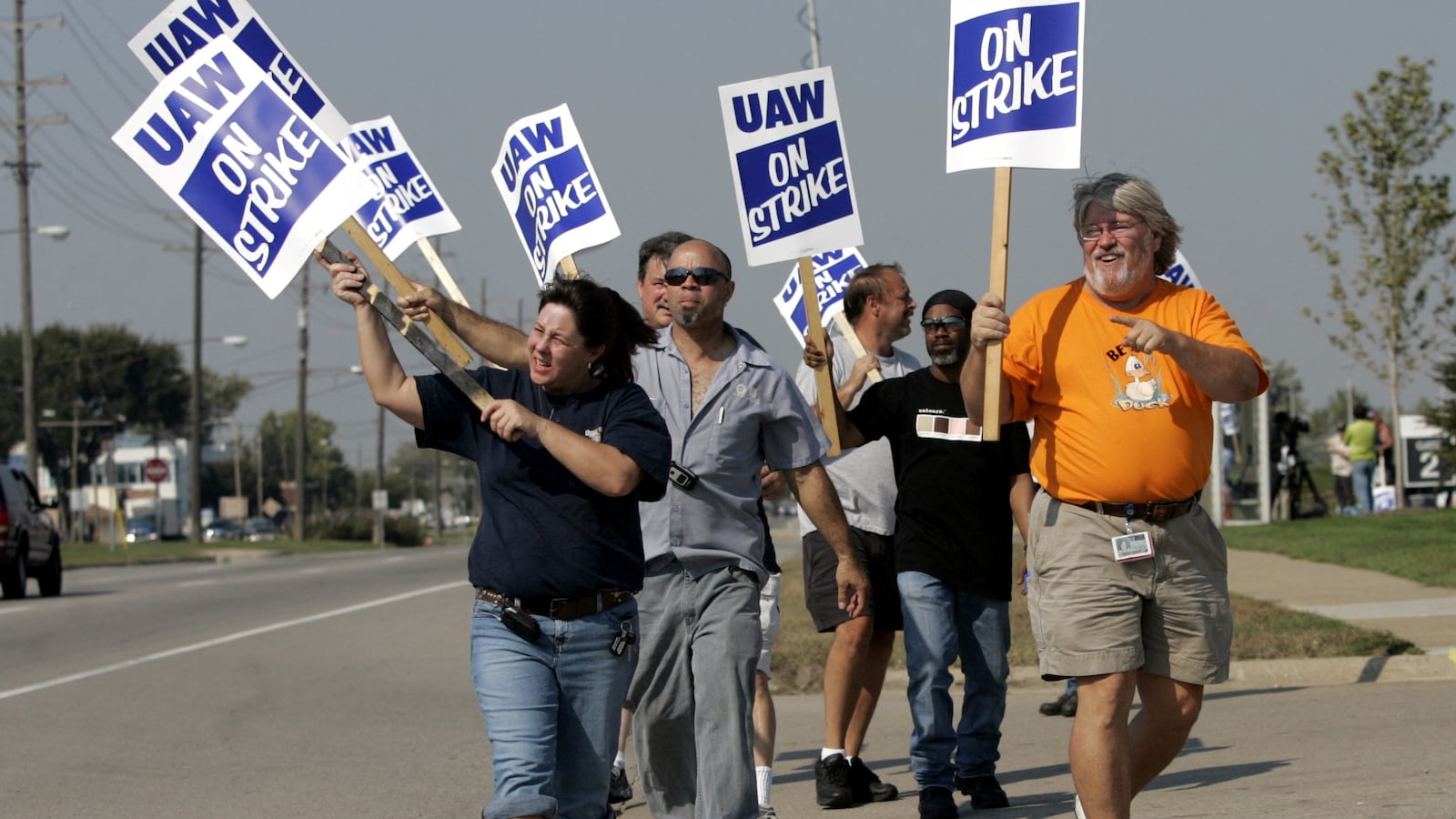President Joe Biden aggressively sided with the United Auto Workers’ strike on Friday, calling on each of the “Big Three” car manufacturers—General Motors, Ford and Stellantis (formerly known as Chrysler)—to come to the table and strike a deal to increase pay and benefits.
Biden made the brief comments on Friday, just hours after 13,000 workers went on a work stoppage—the first time in history that Big Three workers have walked off the job simultaneously.
While auto execs have fumed over the strike and accused the union of making outlandish demands, Biden pointed the finger back at them. He said the companies made “record profits in recent years” off the backs of the “extraordinary skill and sacrifices” of union workers.
“The bottom line is that autoworkers help create America’s middle class,” Biden said. “They deserve a contract that sustains them in the middle class.”
Biden said he dispatched deputy Labor Secretary Julie Su and White House senior adviser Gene Sperling to Detroit on Friday to work with union leadership and automaker execs to strike a fair deal.
“No one wants a strike,” he said, “but I respect workers’ rights to use their options under the collective bargaining system and understand their frustrations.”
The union had set a deadline for overnight Thursday to reach an agreement with automakers over a list of hefty demands that included 36-percent raises for hourly workers, a four-day work week, cost-of-living adjustments, increases to vacation and family leave, and a return to a traditional pension system, among other requests.
The auto manufacturers balked, with Ford Motor Company CEO Jim Farley saying during a Thursday interview on CNN that the proposals would “put us out of business.”
“You want us to choose bankruptcy over supporting our workers,” he added, lamenting the fact that the UAW had not come back to the table after the companies put together a record proposal to meet at least some of the union’s demands: 20 percent raises, cost-of-living increases, and increases to vacation and family leave that would satisfy the UAW’s requests. “Nothing is going on,” Farley said of the negotiations on Thursday.
Full-time employees at the Big Three make between $18 to $32 an hour—wages the union claims haven’t increased to keep up with inflation.
Just two weeks ago, Biden—who had personally intervened to speak with both sides—sounded optimistic that a strike could be averted.
“I’m not worried about a strike,” he said at the time. “I don’t think it’s going to happen.”
But just after 10 p.m. on Thursday, UAW President Shawn Fain released a video address on Facebook and YouTube confirming that the strike would soon become a reality, and, hours later, workers across the trio of companies officially walked off the job.
Experts predict the union opted against a total strike because it could burn through its $825 million strike fund in as little as 11 weeks. There are about 146,000 UAW members across the three companies.
The U.S. Chamber of Commerce lobbying group issued a stark warning Friday about the strike’s implications, saying that prolonged picketing could tank the U.S. economy.
The strike “will have far reaching negative consequences for our economy, for the American workers directly employed by the Detroit Three, their suppliers and dealers, as well as the thousands of small businesses and families whose livelihoods will also be put at risk,” the group said in a statement.
Other experts warned that shrinking inventories from U.S. carmakers, which are typically more affordable than foreign cars, could drive prices up sharply at dealerships.
The strike’s impact was felt immediately on Wall Street, with CNN reporting U.S. stocks were largely down across the board—the Dow by .1 percent, the S&P 500 by .4 percent, and the Nasdaq Composite by 0.5 percent on Friday morning.
The first round of plants where employees walked off the job included a GM facility manufacturing trucks and vans in Wentzville, Missouri; Ford’s Ranger and Bronco plant in Wayne, Michigan; and a Stellantis-owned Jeep facility in Toledo, Ohio, according to Fain.
In anticipation of the strike, Stellantis had reportedly bulked up its supply of certain vehicles in recent months, supplying dealers with enough inventory to last an estimated 82 days for Jeep Wranglers and 207 days for Jeep Gladiators. The same wasn’t true for GM and Ford, however, who were already down to just over a month’s supply of their Bronco, Ranger, and Canyon trucks.
More facilities may be included in the strike if negotiations remain at an impasse, Fain said during his address, adding that union officials won’t sit down to negotiate until the carmakers come closer to reaching their demands.
“I’m extremely frustrated and disappointed,” GM’s chief executive Mary Barra said in a Friday interview on CNBC. “We don’t need to be on strike right now.”
Executives from the Big Three largely pointed their criticisms at Fain, pleading with the union to negotiate instead of walking out.
Carlos Tavares, Stellantis’ CEO, called Fain’s strategy “posturing.” Farley, the Ford CEO, said this week, “We are here and ready to reach a deal. We should be working creatively to solve hard problems rather than planning strikes and PR events.”
Barra added Friday, “Every negotiation takes on the personality of its leader.”







